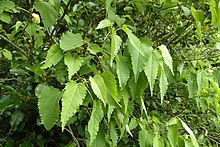Hoheria lyallii
| Hoheria lyallii | |
|---|---|

| |
| H. lyallii in Mount Cook Village, Canterbury, New Zealand | |
| Scientific classification | |
| Kingdom: | Plantae |
| Clade: | Tracheophytes |
| Clade: | Angiosperms |
| Clade: | Eudicots |
| Clade: | Rosids |
| Order: | Malvales |
| Family: | Malvaceae |
| Genus: | Hoheria |
| Species: | H. lyallii |
| Binomial name | |
| Hoheria lyallii | |
Hoheria lyallii, the mountain lacebark, is a species of flowering plant in the mallow family Malvaceae, native to New Zealand, where it grows on drier mountainous areas of South Island — mainly in eastern Canterbury and Marlborough. Growing to 7 m (23 ft), it is a deciduous shrub or small tree with hairy leaves and slightly scented white flowers in summer.[3]
The Latin specific epithet lyallii honours the Scottish naturalist and explorer David Lyall (1817–1895).[3] In cultivation in the United Kingdom this plant has gained the Royal Horticultural Society's Award of Garden Merit.[4][5] Hoheria lyallii and Hoheria glabrata (which has a similar appearance) are known in Māori as houi, and were likely used as textiles by South Island Māori.[6]
References
- ^ "Hoheria lyallii". The Plant List. Retrieved 6 March 2018.
- ^ "Hoheria lyallii Hook.f." International Plant Names Index. Retrieved 6 March 2018.
- ^ a b "Hoheria lyallii". New Zealand Plant Conservation Network. Retrieved 6 March 2018.
- ^ "RHS Plantfinder - Hoheria lyallii". Retrieved 6 March 2018.
- ^ "AGM Plants - Ornamental" (PDF). Royal Horticultural Society. July 2017. p. 49. Retrieved 2 March 2018.
- ^ Neich, Roger (1996). "New Zealand Maori Barkcloth and Barkcloth Beaters". Records of the Auckland Institute and Museum. 33: 111–158. ISSN 0067-0464. JSTOR 42906461. Wikidata Q58677501.
